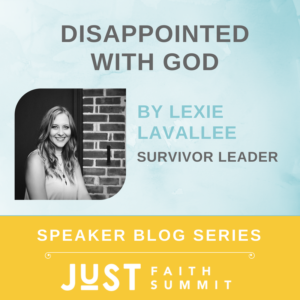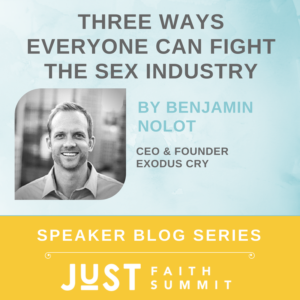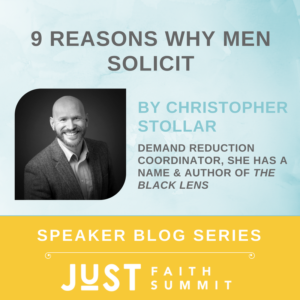By Christine Erickson, Director, Children-at-Risk “OneLess” Ministry Grace Church – Eden Prairie, MN
Biblical Justice & Social Justice
Is there a difference?
Selling a human being. Abusing a child. Stealing from a widow. Most, if not all of us, would agree that using force or fraud to exploit the vulnerable is evil. We carry within us an innate sense of right and wrong, a conviction that oppressors should be punished and the weak protected. We want justice.
Justice in its simplest form, means to set things right. Yet, how do we know what is right? Who defines “right”? Is it society-at-large or the culture we live in? Is there a moral law that we inherently know to follow?
Biblical Justice
As Christ-followers, the answer is simple. Our sense of justice is imparted to us by our Creator God. He is loving, kind, and merciful and He is also righteous, holy, and just.
“The Rock, His work is perfect, for all his ways are justice. A God of faithfulness and without iniquity, just and upright is he.” (Deuteronomy 32:4).
“Righteousness and justice are the foundation of your throne; steadfast love and faithfulness go before you.” (Psalm 89:14).
God is just. It is part of His character, which means He is always just. He cannot be unjust, and He defines and sets the standard for justice.
We hear that God is love and God is holy more often than we hear that God is just. And we may readily agree that God sets the standard for love and holiness, but do we understand that He also sets the standard for justice? Pursuing biblical justice means we follow God’s way to make right that which is wrong, and we look to Scripture to define what is “right”.
We do not have to look far to see that Jesus is our standard of righteousness. Jesus Christ lived a perfect, sinless life, died a sacrificial death and rose again to make right that which was wrong. It is because of Jesus and His work on the Cross that we can be justified and made right with God. And Jesus also demonstrates a beautiful example for us to follow in the New Testament as one who cared for the outcast and reached out with compassion to help those most often overlooked. Jesus pursued justice. He physically and spiritually rescued those in need. Healing the leper in Matthew 8 and caring for the woman caught in adultery in John 8 are just a few examples.
As we look at the life of Jesus and the mandate given throughout Scripture, it is clear that Christ-followers are called to “do justice”. We are called to take action and confront evil, to care for the vulnerable, and to make right that which is wrong. This mandate is not new. It is not a cultural fad or something that is simply a trend in today’s society. Throughout the Old and New Testament, our call to do justice is clear.
“Give justice to the weak and the fatherless; maintain the right of the afflicted and the destitute,” (Psalm 82:3).
“Learn to do good; seek justice, correct oppression; bring justice to the fatherless, and please the widow’s cause,” (Isaiah 1:17).
“He has told you, O man, what is good; and what does the Lord require of you but to do justice, and to love kindness, and to walk humbly with your God?” (Micah 6:8).
“But woe to you Pharisees! For you tithe mint and rue and every herb, and neglect justice and the love of God. These you ought to have done, without neglecting the others,” (Luke 11:42).
Social Justice
Social justice is a common term used today. A brief online search will uncover varying definitions of what it means. One definition says social justice is “promoting a just society by challenging injustice and valuing diversity”. On one hand that sounds fine, but looking deeper, it is rather vague and can lead to many different conclusions about what justice really looks like.
In contrast to social justice, which focuses on a temporal view of addressing injustices in society, biblical justice starts with the eternal in mind. It starts by seeing people as God sees them – recognizing that we are all created in the image of God. And it is incumbent upon Christ-followers to pursue physical and spiritual freedom for the oppressed so others can also become what God created them to be. If we have experienced freedom, how can we not pursue freedom on behalf of others?
As the Church, we may partner with those doing the work of social justice in our communities, but let us not be confused about our ultimate mission. Our mission is not about picking up another cause because it sounds appealing and makes us look good. Our mission is about fully embracing the cause of Christ. The end goal of biblical justice is seeing lives reconciled to God and eternally transformed.
What can we do?
One day there will be perfect justice, carried out by a perfectly holy and just God. In the meantime, evil is pervasive throughout our world. Children are sold into sex slavery. The poor are beaten and forced to work without pay. Human trafficking or modern-day slavery continues in every country, city, and community. There are more than 35 million slaves in the world today, more than at any other time in history.
Can we, the Church, lead the way and pursue justice on behalf of the oppressed, the widow, the orphan, and the enslaved? If we know the One who is completely just, should we not lead the charge? YES!
Fueled by the compassion of Christ, we engage in issues of injustice – protecting the vulnerable, fighting for those held in oppression, walking alongside the wounded and pointing them to the One who heals, restores and redeems.
Pursuing justice starts and continues with a foundation of prayer, because we know it is His battle not our own. It involves time and sacrifice. It means stepping out of our comfort zone and persevering with patience. It means walking in wisdom and not jumping in haphazardly or foolishly. Our just God leads and we follow as He empowers us through the Holy Spirit. So, let’s go. Let’s engage in the fight for biblical justice.
 By Lexie LaVallee, Survivor Leader
By Lexie LaVallee, Survivor Leader By Benjamin Nolot, CEO & Founder, Exodus Cry
By Benjamin Nolot, CEO & Founder, Exodus Cry
 By Christopher Stollar
By Christopher Stollar





